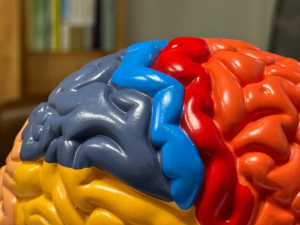
Human Brain, Scientific Model
This article is about semantics and meaning-giving in terms of “OCD”. Explore what happens by the shift from “disorder” to “phenomenon.”
What means OCD?
OCD is the abbreviation of “Obsessive Compulsive Disorder”.
What means obsessive?
Obsessive means “Persistent, intrusive thoughts or preoccupation with something.”
What means compulsive?
Compulsive means “Irresistible urge to do something repeatedly despite negative consequences.”
How can someone without OCD imagine what OCD is?
People might think that The Obsessive Compulsive Disorder consists of “Persistent, intrusive thoughts or preoccupation with something, connected to the irresistible urge to do something repeatedly despite negative consequences.”
Why is OCD so “difficult” to cure?
Following the definition of OCD, patients have no chance: If something is “persistent” and “irresistible” (as the definition claims), it cannot be cured.
What are classical treatment attempts according to OCD?
Psychiatrists and clinics claim Cognitive Behavioral Therapy (CBT) with Exposure and Response Prevention (ERP) and / or in combination SSRI medications – antidepressants like fluoxetine (Prozac), sertraline (Zoloft), fluvoxamine (Luvox), paroxetine (Paxil), and clomipramine that increase serotonin levels the best therapy options.
Heavy weapons against a severe, rather hopeless diagnosis: “persistent” and “irresistible”.
What is, based on Lancet-Evidence, the life-long cure rate with classical OCD treatment?
There exist no studies. There are only some claims about “up to 80 percent” – but this is connected to a short time period (like 12 months).
One study shows 32% to 70% remission rates in children/adolescents, but this is not life-long follow-up.
- International Journal of Neuropsychopharmacology | Oxford Academic: “From Treatment Response to Recovery: A Realistic Goal in OCD”
- PubMed Central®: “From Treatment Response to Recovery: A Realistic Goal in OCD”
What if we would change the description and the definition of OCD?
What will happen to “patients” if they think about phenomena like intrusive thoughts or the “urge” of washing hands or “counting / touching things” in order to avoid accidents the following:
“The human brain is full of constant associations. Many associations are beneficial, some not. If I connect to a strange thought the attribute [cruel, blasphemed] or related, I will have bad feelings. If I laugh at a strange thought, it will be meaningless.” Could someone “succeed” in developing a disorder, then?
What are uncommon strategies to cope with the phenomena of OCD?
Hypnotherapy (Milton Erickson) and Renaming / Reframing are uncommon strategies to cope with strange thoughts and the impression of being forced to do something. Another uncommon strategy (I am applying this to my supervision clients in Frankfurt and all over the place), is the concept of “Mind Rooms”.
How can “Mind Rooms” help to make “intrusive thoughts” meaningless?
Mind Rooms works with the transportation principle. That means, the client imagines he can (and if he imagines, he does) carry an intrusive thought to some chamber in his mind or brain where other strange thoughts have a meeting, impressing themselves by the wildness they can produce. That means, “intrusive thoughts” are no longer “dangerous” but simply strange, impressive, maybe even ridiculous.
Can humor help to cope with OCD?
We should go for evidence in science and read this meta analysis: Does the Relation Between Humor Styles and Subjective Well-Being Vary Across Culture and Age? A Meta-Analysis.
This abstract presents the rigorous scientific evidence from a comprehensive meta-analysis of 85 studies with 27,562 participants:
Methods behind this Meta-Analysis about Humor
This is based on a systematic meta-analysis of 85 studies encompassing 27,562 participants across 12 countries (2003-2019). Studies examined associations between Martin’s four-factor humor taxonomy – adaptive styles (affiliative, self-enhancing) and maladaptive styles (aggressive, self-defeating) – and validated measures of subjective well-being, including depression, anxiety, life satisfaction, optimism, and stress indicators. Effect sizes were calculated using Hunter-Schmidt meta-analytic procedures with correction for sampling error.
What are the Findings by this Meta-Analysis about Humor?
Adaptive humor styles demonstrated robust protective effects against psychological distress.
Self-enhancing and affiliative humor showed significant positive correlations with positive well-being indicators (ρ = 0·227, 95% CI 0·201-0·253) and significant negative correlations with distress markers (ρ = -0·124, 95% CI -0·149 to -0·099).
Conversely, maladaptive humor styles (aggressive, self-defeating) were significantly associated with increased psychological distress (ρ = 0·181, 95% CI 0·154-0·208) and reduced positive affect (ρ = -0·160, 95% CI -0·185 to -0·135).
These protective effects demonstrated remarkable cross-cultural stability, with no significant moderation by Eastern versus Western cultural orientation (p > 0·05) or developmental stage from childhood through adulthood (p > 0·05).
Publication bias analyses confirmed the robustness of findings across all four humor-wellbeing associations. Interpretation Adaptive humor styles function as culturally-universal protective factors against psychological distress, offering clinically-relevant effect sizes comparable to established psychosocial interventions. The capacity to use humor for self-enhancement and social affiliation appears to buffer individuals against negative emotional states while promoting positive psychological functioning, regardless of cultural background or developmental stage. These findings support the integration of humor-based interventions in mental health promotion and stress management protocols.
Hypothesis
As there is evidence in using humor, and as Mind Rooms can add humor to “heavy” topics, there can be benefit in scientific experiments and studies on Mind Rooms and OCD.
Buy Mind Rooms, read it, and cope with OCD. (If you really should not see any improvement within 10 days, you’ll get your money back. No questions asked.)